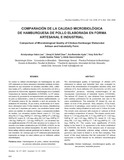Comparación de la calidad microbiológica de hamburguesa de pollo elaborada en forma artesanal e industrial

Ver/
Fecha
2008-11-28Autor
Palabras Clave
Hamburguesa de pollo, Calidad microbiológica, Proceso artesanal, Proceso industrialChicken hamburger, Microbiological quality, Artisan process, Industrial process
Metadatos
Mostrar el registro completo del ítemResumen
Se evaluó la calidad microbiológica de hamburguesa de pollo (HP) elaborada en forma artesanal e industrial mediante la determinación de sus recuentos de aerobios mesófilos (AM), coliformes totales (CT), coliformes fecales (CF), Escherichia coli (EC) y presencia de Salmonella, siguiendo metodologías de la Comisión Venezolana de Normas Industriales (COVENIN). La HP artesanal (marca A), provenía de un supermercado con permiso sanitario para su elaboración y venta en el mismo establecimiento. La HP industrial (marca B), fue obtenida a nivel del productor. Se analizaron 60 muestras, 30 por marca, recolectadas en 6 muestreos, efectuados cada 15 días durante tres meses, obteniéndose en cada uno 5 muestras por marca. Los resultados fueron analizados con análisis de varianza en bloque y comparación múltiple de medias. Los recuentos medios fueron: marca A: 7,33 log10 ufc/g AM, 5,17 log10 NMP/g CT, 3,62 log10 NMP/g CF y 2,40 log10 NMP/g EC, marca B: 1,55 log10 ufc/g AM, 2,27 log10 NMP/g CT, 1,66 log10 NMP/g CF, 1,25 log10 NMP/g EC. Los recuentos fueron significativamente (P<0,05)
más elevados en la marca A. De acuerdo a los límites establecidos por COVENIN, el 56,6% de las muestras fueron de calidad inaceptable. Se aisló Salmonella enterica subsp enterica serovar gaminara en la marca A, en el primer muestreo. Se concluye que la HP elaborada artesanalmente representa un riesgo de salud pública por su deficiente calidad microbiológica.
Colecciones
Información Adicional
| Otros Títulos | Comparison of microbiological quality of chicken hamburger elaborated artisan and industrially form |
| Resumen en otro Idioma | The microbiological quality of hamburger of chicken (HP) elaborated in artisan and industrial form was evaluated by means of the determination of mesophiles aerobics (AM), total coliforms (CT), fecal coliforms (CF) Escherichia coli (EC) and Salmonella’s presence, following methodologies of the Venezuelan Commission of Industrial Norms (COVENIN). The artisan HP (brand A), was obtained from supermarket with sanitary permission for its production and sale in the same establishment. The industrial HP (brand B), was obtained at level of the producer. Sixty samples, 30 by brand, collected in 6 samplings, were carried out every 15 days for three months, being obtained in each one it 5 show for mark. The results were analyzed with analysis of variance in block and multiple comparison of means. The means counts were. Brand A: 7.33 log10 cfu/g AM, 5.17 log10 NMP/g CT, 3.62 log10 NMP/g CF and 2.40 log10 NMP/g EC; brand B: 1.55 log10 cfu/g AM, 2.27 log10 NMP/g CT, 1.66 log10 NMP/g CF, 1.25 log10 NMP/g EC. The counts were significantly (P<0.05) higher in the brand A. In agreement to the limits established by COVENIN, the 56.6% of the samples was of unacceptable quality. Salmonella enterica subsp enterica serovar gaminara was found in brand A, in the first sampling. That represents a health hazard by its deficient microbiological quality. |
| Colación | 624-630 |
| País | Venezuela |
| Institución | Universidad del Zulia (LUZ) Universidad de Los Andes (ULA) |
| Publicación Electrónica | Revista Científica |
| Sección | Revista Científica: Tecnología de Alimentos |





